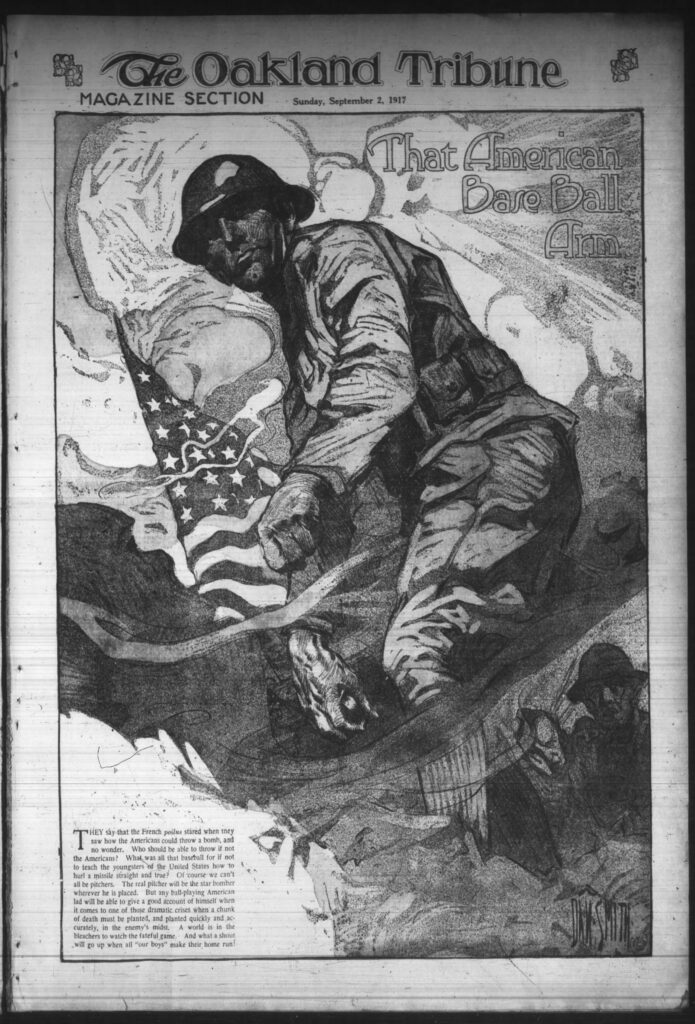First of October, last day of the baseball season. Not really the last last day — two rounds of playoffs and a non-global World Series are still to come. But in reality and emotionally for most teams and most fans, Sunday was it. It’s a great occasion for musing on the changes of season and of life. Let’s skip that; Roger Angell and by now about fifty-one other diamond prose slingers have been there and done that. Besides, I went to just one game all year (the A’s cuffed the upstart Tigers). But I’ll indulge in a couple of pictures that come to mind:
–Fan Appreciation Day, Oakland Coliseum, 1983 or ’84 or ’85: The last Saturday of the season. I went with Kate. We sat in the second of the three decks on the third-base side. I don’t remember who the A’s played or what the outcome was. But the park had that look it only gets at the tail end of the year, the afternoon light coming in at an odd low angle. It being Oakland, the game was sparsely attended, as it should have been, the A’s having descended into a stretch of mediocre years. What I remember, though: Seagulls, crowds of them, all over the field and the stands long before the game was over.
–Last day of the season, Oakland Coliseum, 1986: Kate and I were going to go to the last game of the year with out friends Robin and Jim, who were and are the most faithful A’s fans we’ve ever known. Something came up that I thought I had to do, so Kate went with them to the game; I was going to drive down whenever my work, whatever it was, was done. I had the game on from time to time, and realized as it progressed that the A’s pitcher, Curt Young, had not given up a hit. Around the sixth inning, I left for the game, now aware that Young was pitching a perfect game. Now I started to worry: I had waited so long to go to the game that now I was going to miss a piece of baseball history. While I was on the freeway, the game went into the 7th. Young got one out, then two; he had retired the first 20 batters in a row. I’d be in time to see the end of it; the 21st batter came up (by looking it up, I know it was Kevin Seitzer and the game was against the Kansas City Royals). He hit an infield grounder and beat the throw to first for a hit. I was simultaneously crushed and relieved; too bad about the perfect game, bu at least now I hadn’t missed one (Seitzer turned out to be the only base runner Young allowed that day). I got to my seat in the top of the 8th.
Enough of the glory of my times. One team I follow, the A’s, is going to the playoffs; they’re playing the Minnesota Twins, a team they’ve had real problems with the last four or five years, so I don’t have big hopes.
My other team is the Cubs. That’s a legacy of having grown up in the Chicago area, having gone to my first game at their park and maturing as a fan, if that’s what fans do, just at the time their good late ’60s team came along. That’s ancient history, though, and by now I don’t have a single atom of sentimentality left for them. They’re just a bad team, no more cute or colorful or loveable or worthy of some special loyalty than, say, the Tampa Bay Devil Rays. They’re so bad, they even fail to excel in failure. They did manage to lose 96 games this year, more than any other team in their league. But the mark of a colossally bad team is to lose 100 games; the Royals and Devil Rays managed to achieve that, but the Cubs fell short.
The horror show the Cubs put on has no apparent effect on fans’ willingness to pay to watch. The team drew a full house Sunday, as they did nearly every game. More than 3 million people attended their games this year. The explanation has got to be that the score doesn’t matter any more; the old park, the red brick, the ivy on the walls, the big centerfield scoreboard, the Old Style and franks and Frosty Malts, have become a draw in themselves.
Maybe It’s a little like visiting the U.S. Capitol or the White House. The scoundrels and miscreants in residence today matter less than having an idea what the places were built for and knowing that once, they were home to a Jefferson or a Lincoln or an FDR. Still, I think I liked baseball better when people just stopped coming out to the park when the team stunk. Tickets were easier. And that autumn light, a sparse crowd and a big flock of seagulls seem like the perfect sendoff for a failed season.
Technorati Tags: baseball, sports
Like this:
Like Loading...

